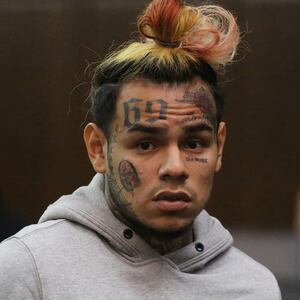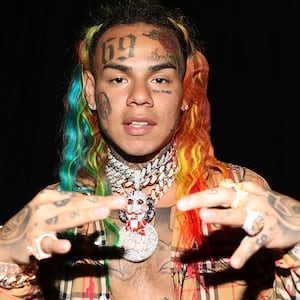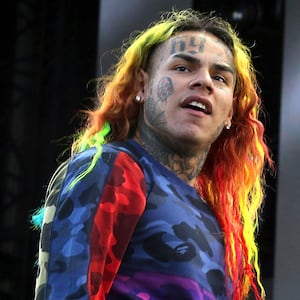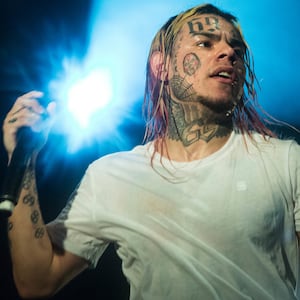It took gangbanging rapper Tekashi69 just one day after his arrest to decide he was going to cooperate with the feds—and lay out for a jury how the Nine Trey Bloods jump-started his career, which he then used to bankroll the crew.
“I got the street credibility. I would say I got my career,” the hip-hop star testified Tuesday in a Manhattan federal courtroom where two of his ex-associates are on trial.
“I knew I had a winning formula for my music videos: repeat the gang image. That’s what people liked.”
Dressed in navy blue prison jumpsuit, his trademark rainbow hair mostly grown out, Tekashi was the third witness to take the stand against Aljermiah “Nuke” Mack, 33, and Anthony “Harv” Ellison, 31. Mack is charged with racketeering and trafficking in narcotics such as fentanyl, while Ellison is charged with racketeering and gun crimes in connection with an alleged kidnapping of Tekashi last July.
The hyper-aggressive persona on display in Tekashi’s videos was gone on the witness stand. Instead, the 23-year-old recording artist looked nervous as he described the symbiotic relationship he established with the Nine Trey Bloods: They provided protection as his fame grew, and he provided a revenue stream for their illicit activities.
“My role was, just keep making hits and be the financial support for the gang,” he said as he touched his brunette Dutch pigtails.
Prosecutors allege Tekashi also helped Ellison and Mack carry out a 2018 gunpoint robbery of their gang rivals in Manhattan, filming the heist from a nearby car. And in court, the rapper admitted his role wasn’t purely monetary.
“We participated in a lot of crimes,” the rapper testified. “Robberies, assaults, drugs.”
Tekashi, whose real name is Daniel Hernandez, became a viral star in 2014 with unabashedly raunchy Instagram and YouTube videos that often featured guns and drugs. The Brooklyn-born rapper, who hit the mainstream music scene in 2016, is best known for his hit single last year with Nicki Minaj, “FEFE.”
He was arrested last year in a takedown of the Nine Trey Bloods and pleaded guilty in February to nine federal charges, including firearms offenses, racketeering, and drug counts. (The rapper also previously pleaded guilty in 2015 to child porn charges after filming a sexually explicit video with a 13-year-old girl—a video he once said was intended to boost his “scumbag” persona and was “just for shock value.”)
As part of the deal with federal prosecutors, Tekashi had to take the stand against reputed Nine Trey Bloods who opted for trial.
On Tuesday, he told jurors he was first introduced to the gang in 2017 through his former manager while taping a music video for his first hit single, “GUMMO.” He said once he found out his manager had a gang affiliation, he “asked if Nine Trey members would be in the video” because he wanted their “aesthetic.”
“I said I wanted them to be wearing all red,” Tekashi added, noting the color symbolizes the gang’s Bloods affiliation. “Before I went to the house where we were shooting, I went to buy three dozen red bandanas for them to wear.”
As prosecutors played the infamously rowdy, career-launching video, to point out notable gang members, Tekashi bopped his head to the beat, seemingly enjoying his own music.
He added that a month after “GUMMO”’s “instant success,” he created the music video for his hit “KOODA” and then “was officially a Nine Trey member.” He eagerly translated various gang codes for the jury, showing off the secret handshake, and proudly listing the hierarchy of the Bloods lineage.
Both Mack and Ellison looked straight ahead, showing no emotion throughout Tekashi’s testimony.
Assistant U.S. Attorney Jonathan Rebold previously described Ellison as the “muscle and manager” for Tekashi until he was ousted from the gang in July 2018—a move that allegedly prompted Ellison kidnap and rob Tekashi for revenge.
Tekashi testified he was coming home from another video shoot when he was jumped by three men in hoodies who blocked off his car. He alleges the men hit him over the head with a pistol, before dragging him into their car and driving him around while demanding his money and jewelry. The rapper said they took about $750,000 worth of jewelry and $20,000 in cash.
The rapper’s arrangement with the street gang allegedly disintegrated after that incident, just months before he and a dozen other alleged members were indicted on racketeering charges in November. He was asked when he decided to turn state’s witness.
"The next day. The day after we were taken down," he said.
During opening statements on Monday, defense attorneys slammed Tekashi as an unreliable witness and claimed he faked his own kidnapping for publicity.
“It’s a hoax!... It’s a ‘Jussie Smollett,’ if you will,” Deveraux Cannick, Ellison’s attorney, said, referring to the former Empire star who made headlines this year after allegedly staging a fake hate crime against himself.
Tekashi is expected to continue his testimony on Wednesday. He is facing a minimum penalty of 47 years in prison but under the terms of his plea deal, he could serve far less.









